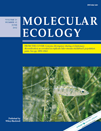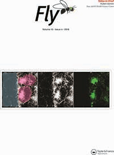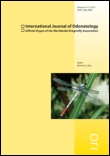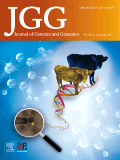
MOLECULAR ECOLOGY
Scope & Guideline
Advancing the Frontiers of Ecology and Genetics
Introduction
Aims and Scopes
- Molecular Mechanisms of Evolution:
Research often explores the molecular mechanisms underlying evolutionary change, including gene expression, genetic drift, and natural selection, to understand how species adapt to their environments. - Ecological Genetics:
The journal publishes studies that investigate the genetic basis of ecological traits and interactions, including population structure, gene flow, and the impact of environmental changes on genetic diversity. - Conservation Genomics:
There is a strong emphasis on conservation-related research that utilizes genomic tools to assess genetic diversity, identify management units, and inform conservation strategies for endangered species. - Microbiome Interactions:
Research on the roles of microbial communities in host health, ecology, and evolution is a significant focus, examining how microbiomes influence host traits and interactions with the environment. - Adaptation and Plasticity:
Studies often highlight adaptive responses to environmental stressors, including phenotypic plasticity and the genetic basis of adaptation in various taxa. - Hybridization and Speciation:
The journal covers research on hybridization processes and their implications for speciation, including genomic analyses that reveal patterns of introgression and reproductive isolation.
Trending and Emerging
- Environmental DNA (eDNA) Applications:
The utilization of eDNA for biodiversity monitoring and environmental assessments is rapidly gaining traction, showcasing its effectiveness in detecting species presence and community composition. - Genomic Approaches to Conservation:
There is a growing trend towards using genomic data to inform conservation strategies, including studies that assess genetic diversity, inbreeding, and adaptive potential in endangered species. - Microbiome Research in Ecology and Evolution:
Research focusing on the role of microbiomes in ecological interactions and evolutionary processes is expanding, with studies examining host-microbe interactions and their implications for health and fitness. - Adaptation Genomics and Phenotypic Plasticity:
Emerging studies are increasingly investigating the genomic basis of adaptation and phenotypic plasticity, exploring how organisms respond to environmental changes at the genetic level. - Multi-Omics Approaches:
The integration of various omics technologies (genomics, transcriptomics, proteomics) is on the rise, allowing for a holistic understanding of biological processes and interactions.
Declining or Waning
- Traditional Morphological Studies:
There is a noticeable decline in studies relying solely on morphological data for species identification and classification, as molecular techniques gain prominence for resolving phylogenetic relationships. - General Biodiversity Surveys:
Research that focuses solely on broad biodiversity assessments without molecular techniques has decreased, as the field shifts towards more integrative approaches that combine ecological and genomic data. - Single-Locus Studies:
The focus on single-locus genetic studies is waning in favor of genome-wide association studies (GWAS) and multi-locus approaches that provide a more comprehensive understanding of genetic diversity and adaptation. - Descriptive Ecology without Molecular Insights:
There is a reduction in descriptive ecological studies that do not incorporate molecular data, as the integration of molecular techniques is increasingly seen as essential for understanding ecological dynamics.
Similar Journals

NATURE REVIEWS GENETICS
Transforming Knowledge into Genetic Understanding.NATURE REVIEWS GENETICS, published by NATURE PORTFOLIO, stands as a leading journal in the field of genetics, boasting a remarkable reputation reflected in its Q1 ranking across multiple categories including Genetics, Clinical Genetics, and Molecular Biology. With an impressive percentile of 99th in both Genetics and Clinical Genetics, as well as a solid rank in Molecular Biology, this journal is pivotal for researchers, professionals, and students alike who seek to stay informed on the latest advancements and comprehensive reviews in genetic research. The journal's scope encompasses a wide array of topics, providing in-depth insights from fundamental genetic principles to clinical applications, underscoring its importance in bridging basic science and medical practice. Though not an open-access publication, it remains accessible through various academic institutions, enhancing its reach and influence within the scientific community. With publication years spanning from 2000 to 2024, NATURE REVIEWS GENETICS continues to shape the future of genetics research and education.

Evolutionary Biology
Unraveling the Mysteries of Life's EvolutionEvolutionary Biology is a distinguished academic journal published by Springer, focusing on the intricate fields of ecology, evolution, behavior, and systematics. This journal, with the ISSN 0071-3260 and E-ISSN 1934-2845, has established itself as a critical platform for cutting-edge research and innovative ideas that shape our understanding of biological evolution and its implications. Operating from Germany, it ranks in the Q2 quartile in its category for 2023, placing it in the top tier of journals recognized for quality and impact, with a Scopus rank in the 66th percentile among its peers. Despite not being Open Access, this journal ensures comprehensive dissemination of knowledge essential for researchers, professionals, and students passionate about evolutionary studies. With a publication history tracing back to 1993 and converging years up to 2024, Evolutionary Biology continues to significantly impact the academic landscape, fostering dialogue and collaboration across various disciplines within the biological sciences.

ORGANISMS DIVERSITY & EVOLUTION
Advancing Knowledge: The Intersection of Ecology and EvolutionOrganisms Diversity & Evolution is a premier academic journal published by Springer Heidelberg, dedicated to advancing the fields of ecology, evolution, behavior, and systematics. Established in 2001 and continuing through 2024, this journal plays a crucial role in disseminating high-quality research that explores the complexities of biological diversity and evolutionary processes. With a commendable 2023 Scopus ranking of #253/721 in its category, placing it in the 64th percentile, and categorized in the Q2 quartile for Ecology and Evolution, it consistently attracts contributions from leading scientists and researchers worldwide. Although it operates on a subscription basis, the journal's rigorous peer-review process and dedication to impactful scientific discourse make it an invaluable resource for academics, practitioners, and students keen on understanding the intricate relationships that shape our biodiversity. By highlighting innovative research and fostering discussions on urgent ecological challenges, Organisms Diversity & Evolution serves as a vital platform for those committed to conservation and evolutionary biology.

BIOLOGY BULLETIN
Empowering Research in Genetics and Molecular Biology.BIOLOGY BULLETIN is a prominent academic journal published by PLEIADES PUBLISHING INC, dedicated to advancing the fields of Agricultural and Biological Sciences as well as Biochemistry, Genetics, and Molecular Biology. With an ISSN of 1062-3590 and E-ISSN of 1608-3059, the journal has been a vital resource for researchers and professionals since its commencement in 1996. Located in the United States, BIOLOGY BULLETIN operates within a highly competitive academic landscape, achieving a 2023 ranking in the Q3 quartile for Agricultural and Biological Sciences and Q4 for Biochemistry, Genetics, and Molecular Biology, highlighting its commitment to delivering impactful research despite its challenges. Researchers seeking to publish their findings will find a platform for significant insights, as reflected in its Scopus rankings, where it stands at #183 and #199 out of 221 in its respective categories, showcasing opportunities for growth and visibility. While currently not an open-access publication, BIOLOGY BULLETIN plays a crucial role in facilitating scholarly communication and fostering an understanding of biological sciences, making it an essential read for academics, professionals, and students alike.

GENETICA
Bridging the Gap Between Genetics and Practical ApplicationsGENETICA is a prominent journal published by SPRINGER, dedicated to advancing the field of genetics and its applications across various biological disciplines, including animal science, plant science, and insect science. Since its inception in 1919, the journal has consistently served as a vital platform for researchers and professionals to disseminate high-quality research findings that explore the genetic bases of biological phenomena. With its current scope spanning from 1943 to 2024, GENETICA holds a commendable position in the academic community, as evidenced by its Q2 ranking in both animal science and insect science, and its active contribution to interdisciplinary studies in genetics. Although the journal does not offer open access, it remains accessible through institutional subscriptions and libraries, ensuring its vital research is widely circulated. Researchers, professionals, and students alike will find GENETICA an invaluable resource for the latest discoveries and methodologies in the ever-evolving landscape of genetics.

Evolutionary Bioinformatics
Transforming evolutionary studies with cutting-edge techniques.Evolutionary Bioinformatics, published by SAGE Publications Ltd, is a pioneering open-access journal established in 2005, dedicated to advancing the field of evolutionary biology through innovative computational techniques and bioinformatics. With an ISSN of 1176-9343, it serves as a critical platform for researchers, professionals, and students to disseminate impactful findings and foster collaboration across disciplines. The journal spans a broad scope, contributing significantly to the areas of Ecology, Evolution, Behavior and Systematics, and Genetics, as evidenced by its respectable Scopus rankings and quartile placements in 2023. With a commitment to providing comprehensive, peer-reviewed research articles and tools for sharing knowledge, Evolutionary Bioinformatics plays an essential role in shaping the future of evolutionary studies and bioinformatics. Readers and contributors alike are encouraged to engage with cutting-edge research that pushes the boundaries of understanding in this dynamic field.

FLY
Innovating Research in Insect Ecology and ManagementFLY, an esteemed journal published by Taylor & Francis Inc, is a leading resource in the field of Insect Science, offering cutting-edge research and insights into the biology, ecology, and management of flies and related insect species. With an impressive Impact Factor reflecting its high citation and publication standards, FLY serves as a vital platform for researchers and practitioners aiming to advance their understanding of this diverse and crucial group of organisms. The journal, which has been publishing since 2007 and is set to continue until 2024, is recognized as a Q1 category journal in its discipline, ranked 58 out of 181 in Agricultural and Biological Sciences, placing it in the 68th percentile of the field. Although currently non-open access, the journal is committed to disseminating valuable knowledge and fostering collaboration among scientists, offering unparalleled opportunities for professionals, researchers, and students to engage with transformative science in the insect realm.

INTERNATIONAL JOURNAL OF ODONATOLOGY
Innovating Insights into Odonatology and BeyondINTERNATIONAL JOURNAL OF ODONATOLOGY, published by Wachholtz Verlag GmbH, is a vital resource for researchers and professionals in the fields of Ecology, Evolution, Behavior, and Insect Science. Established in 1998, this journal provides a platform for the dissemination of innovative research pertaining to odonatology, encompassing the ecological and biological interactions of dragonflies and damselflies. With its focus on advancing knowledge within these scientific disciplines, the journal holds a commendable Q3 ranking in Ecology, Evolution, Behavior and Systematics and a Q2 ranking in Insect Science for 2023, reflecting its significance in academic circles. Although it operates without open access, its articles are accessible through institutional subscriptions, allowing for wide dissemination among scholars and practitioners. The journal's commitment to publishing high-quality, peer-reviewed research makes it an authoritative source of information that enriches the study of odonates and their broader ecological contexts. For inquiries, the journal's editorial team can be reached at C/O Fleet7, Fleethorn 7, Kiel 24103, Germany.

Journal of Genetics and Genomics
Pioneering Research for a Genomic FutureThe Journal of Genetics and Genomics, published by SCIENCE PRESS in China, stands as a significant contributor to the fields of Genetics and Molecular Biology. With an ISSN of 1673-8527 and E-ISSN 1873-5533, this esteemed journal has achieved a remarkable reputation, holding a prestigious Q1 ranking in both Genetics and Molecular Biology as of 2023. This journal not only showcases pioneering research but also fosters vital discussions on contemporary challenges and innovations within genomic sciences. As part of its commitment to facilitating scientific advancement, the journal encompasses a range of research articles, reviews, and short communications, all aiming to illuminate the complexities of genetic structures and functions from 2007 to 2024. Researchers, professionals, and students alike are encouraged to engage with its content, which ranks favorably in Scopus—placing it within the top tier of its categories. Join the community of academic excellence and explore the latest findings that shape our understanding of genomics.

Evolution Letters
Connecting scholars to the latest in evolutionary studies.Evolution Letters is a premier Open Access journal published by Oxford University Press, dedicated to advancing research in the interdisciplinary fields of Ecology, Evolution, and Genetics. Since its launch in 2017, this journal has rapidly established itself as a leading platform for high-quality research and innovative studies, as reflected by its impressive Q1 quartile rankings in both Ecology, Evolution, Behavior and Systematics and Genetics for 2023. With a remarkable Scopus ranking placing it in the top 3% in its categories, Evolution Letters serves as a vital resource for scholars and practitioners seeking to understand the complexities of evolutionary processes and genetic developments. The journal’s commitment to Open Access ensures that groundbreaking research is freely available to the global scientific community, fostering collaboration, discovery, and progress in these critical fields of study.